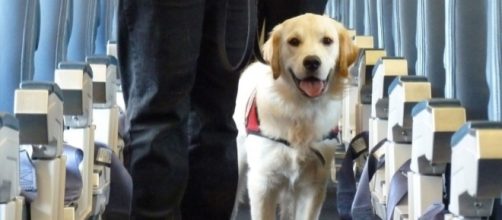More and more animals are traveling on planes these days, even more than they have in years past. Some planes are doubling as airborne kennels to accommodate the increase in four-legged travelers. Some believe it is due to the misuse of the current federal law that allows passengers to fly fee free with pets that are described as emotional-support animals.
The reason for increase in four-legged travelers as stated by the industry trade group
A spokesperson for the International Air Transport Association reports that an increase in the number of animal passengers may be earning frequent-flier miles.
He says that the concern is for a significant amount of fraud involved, as the people that bring a pet on claim it is an emotional support animal, when in reality it is not. Such fraud makes it difficult for those who legitimately need to travel with a licensed therapy dog. Currently, it is quite easy for a person to acquire a letter from a mental health provider, stating the dog is necessary for travel and then have it signed. Such a letter can be obtained online for a small fee.
Resolving the issue of illegal therapy dog travel
Rather than following the Americans with Disabilities Act, there is a problem with the federal Air Carrier Access Act. The Americans with Disabilities Act prohibits discrimination against those with a disability, requiring airlines to transport both emotional-support animals and trained service animals for free.
There is a difference between a highly trained service animal and those labeled for emotional support who have no training whatsoever.
A panel of mental-health professionals and other industries at the U.S. Department of Transportation recently convened to determine possible changes that would help to prevent abuses within the system. Their goal is to create tighter rules to ensure only qualified emotional-support animals ride on flights. Airline authorities continue to study better methods to enforce the law so that people committing fraud are stopped and punished. An airline official states that there has to be a way to ensure a service or therapy dog is indeed authorized to fly as such, commenting that those committing fraud with fake service or therapy animals are only hurting the people who are doing the right thing and need to travel with their animal.

